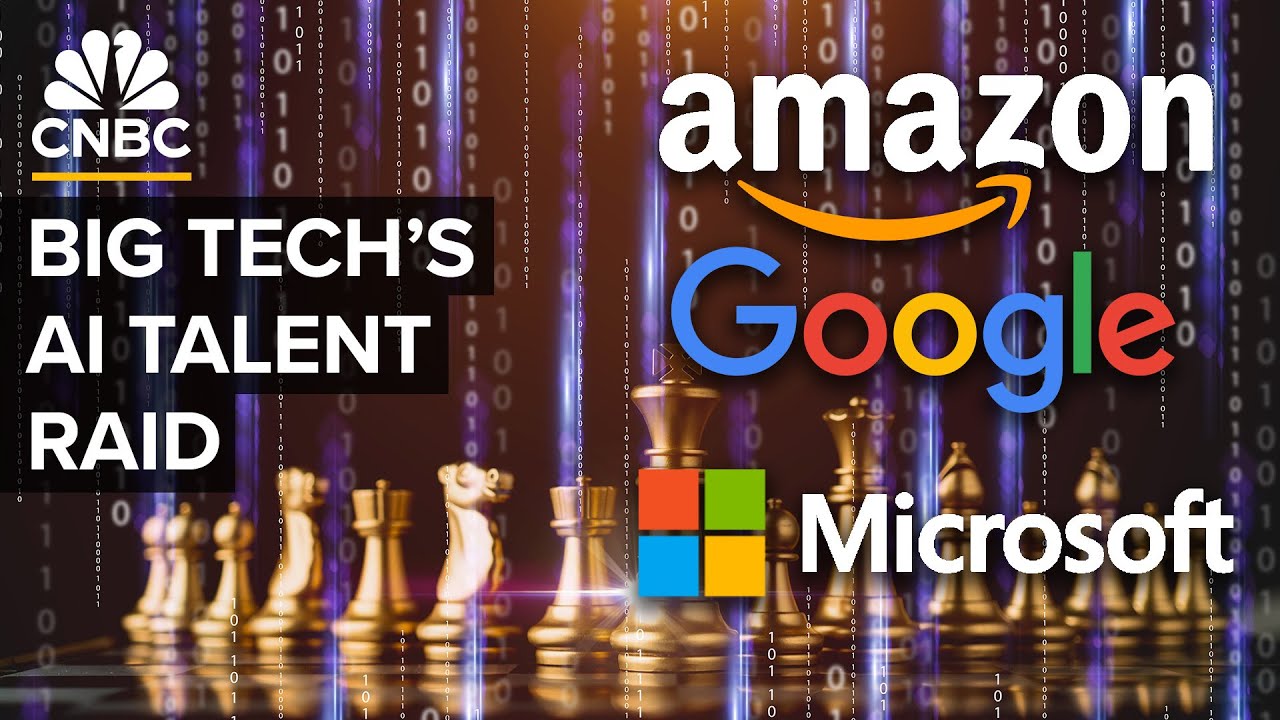Startups are becoming pawns in the megacap game of
chess. Microsoft absorbs Inflection. Big organizational change happening at Microsoft around
AI. Amazon consumes Adept. This startup was valued at more than $1 billion. Now, most of the company is now going to Amazon. Google and Character.AI. Three of the biggest tech companies swallowing three
of the biggest startups in the AI world without Actually acquiring them. The reality is, everywhere you look, we see rapid
concentrations. They're quelling competition, poaching top talent and
skirting scrutiny. While regulators are still playing checkers. I'm Deirdre Bosa and this week on Tech Check, the AI
M&A Fakeout. Character.AI was one of the most promising startups in
the age of generative AI. Personalized AI. How are thee. Let's get to the bottom of this. Highly engaging. Loyal user base. Somebody who sends one message today is active for, on
average, two hours in that Day. $150 million in funding at $1 billion valuation. Character.AI launched its software last September and
has had more than 173 million visits last month. A 61% increase from March. And a founder who pioneered generative AI. When I got started working on these large language
models and inventing this field like in 2016 to 2018, Like very few people were excited. There was just one problem, the startup couldn't make
money, and according to reports, it struggled to Generate enough revenue from paid users. Character.AI, billion dollar valuation. Pre-revenue, very much feels like the 2010 App Store,
where you gain a lot of users and kind of figure out The monetization later. So it turned to a well established money printing
Megacap, Google. Which was happy to cut a deal, especially since it was
arguably more interested in the talent than the
Technology. Character.AI co-founder Noam Shazeer was
an author of a groundbreaking paper That laid the foundation for today's age of AI. It would bring Shazeer back to Google, along with the
fifth of his employees and license Character's Technology, without having to outright buy the startup
in an acquisition. Every person on Earth is going to be inventing their
own applications. It's a playbook that skirts the regulatory crackdown on
big tech dominance, provides an exit for AI startups Struggling to make money, and allows Mega-caps to pick
up the talent needed in the AI arms race. There's a very small number of researchers, AI
practitioners That operate at the frontier of the technology. There's probably only thousands right now, and the
hyperscalers, the megacaps want that talent, And they're looking to get it any way they can. A playbook that Microsoft pioneered. In March, it inked an unusual deal with Inflection, a
prominent AI startup with a chatbot to rival ChatGPT's. Again, not an outright acquisition, just a $650
million agreement that would allow Microsoft to use Inflection's AI models, and hire away
most of its staff, including Founder Mustafa Suleyman, whom they put in charge of
its entire AI unit. He co-founded DeepMind back in 2010, that was later
acquired by Google. In 2022, he co-founded a company called Inflection. He did that with Reid Hoffman. In June, Amazon and Adept AI struck a deal. Amazon reportedly paid at least $330 million to
license Adept's technology, with a $100 million retention bonus to employees who jumped
ship. A big cost center for these startups is GPUs, those
chips, cloud computing. And what does Amazon have? They've got AWS. They've got the cloud computing side
in spades. So if you're a startup and you're looking to partner
with one of these companies or do some sort of Licensing deal, you're going to look at one of the big
tech companies, likely Amazon, Google, Microsoft. For the Megacap and the startup employees who were
hired away. It's a win win. The founders no longer feel pressured
to monetize their business models, being swallowed up By a highly profitable Megacap, that buys some time to
build for the longer term. As these founders are looking to scale their companies. They might see headwinds, any number of headwinds. And it could just be that at this point in time, the
best home for them is, again, a Megacap. And their cloud computing costs needed to develop
gen-AI models running into the hundreds of millions of
Dollars, they get absorbed by the tech giants that own
the infrastructure. We definitely talk to founders that want to develop the
best technologies and just have access to GPU resource And not fight for it, and I think that's why you've
seen some funds spin up clusters of their Own to give founders access. For the Megacaps, it's a quick and easy way to get the
best talent in the field. And that was likely a motivation when Google purchased
DeepMind back in 2014, an example of an all out Acquisition that is highly unlikely to get approved
today. DeepMind was one of the most prestigious independent
AI research labs a decade ago. Google was early and managed to acquire it before
gen-AI was even on the radar of regulators. Today, though, AI is squarely in their crosshairs, and
Gen AI the biggest arms race in tech. Gen-AI aside, Apple, Google, Amazon and Meta, they all
have pending cases before the antitrust Chiefs of the FTC and the DOJ. Google has already found itself on the losing end,
with a federal court ruling it has a monopoly in the Search market and now faces a potential breakup. Big Tech might think they're outsmarting antitrust
enforcers and sidestepping scrutiny, but they could be Playing with fire. The regulators of today, they do
have a few moves up their sleeves. They're more agile and aggressive than ever. The FTC has already opened an antitrust probe into
Microsoft's deal with Inflection, investigating whether Microsoft's structured that deal to gain control of
the startup while also dodging review. And the agency has also launched an informal inquiry
into the Amazon Adept deal. Even Congress has taken notice, with three U.S. Senators calling for an investigation. Lina Khan and others have looked at it. It's not that there's been wholesale mergers of these
things, but even the Partnerships unto themselves. Their main concern isn't just whether or not the
acquisition happened on a technical level. At this moment, AI is a nascent technology that could
catalyze enormous growth and innovation. There's enormous opportunity here for a vibrant
market, but we also see risk. We see risk of consolidation. We see risk of monopolization. It's whether or not the act is ultimately
anti-competitive, especially in a nascent growing space Where having competition is key to making sure that
there's innovation, instead of the same incumbent Behemoths getting ever larger and more powerful. Because, yes, Megacaps, they aren't swallowing
startups whole.
They're leaving behind a shell of a company and some
of its employees still functioning, but not Competitive. Which also brings into sharp relief just
who gets left holding the bag. On the surface, these deals seem like a win win, but
there are employees and investors who are left behind. In the Adept deal, for example, Amazon only hired away
the AI researchers, according to the New York Times. The teams working on product, sales and other areas
weren't so lucky. They don't reap any of the rewards that their former
colleagues do. A new cushier gig, at a proven, big corporation
without the desperate search for viable revenue. Instead, they're left trying to find a way to piece
together a new business without its top talent. In a number of deals of this type, the remaining
company still has access to the IP that's been created, And certainly enough resources as part of the
transaction to continue to hire talent and build upon That IP. Then there's the VC money that initially founded those
startups, those that backed Character.AI, Adept and Inflection. They're being made whole, or almost whole,
through licensing deals. But it is a far cry from the returns they were looking
for. Typically, VCs bet on bigger payoffs. A minimum of 5 to 10 times rate of return is
considered a benchmark for success. One insider, who wanted to remain anonymous, tells me
that there could be more of these types of deals to Come, noting that there are many more overvalued AI
startups that have yet to find viable business Models. Cohere, for example, is another still
independent gen-AI darling that was recently valued at More than $5 billion. It reportedly has less than $25 million in annualized
revenue. A lifeline from a Megacap, that could be a welcome
development as the pressure to monetize builds. But as regulators get wise to the pseudo acquisition,
will Big Tech be willing to tempt them with more deals? Or will the AI unicorns be left to fend for themselves
as the big, get bigger? However it plays out, the AI M&A fakeout has changed
the landscape for generative AI.





